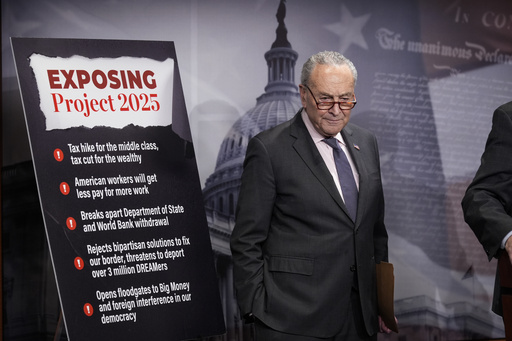
WASHINGTON — The Senate is preparing to vote on the confirmation of Russell Vought as the White House budget director, a position that offers significant power to enhance the authority of the president. Vought, nominated by President Donald Trump, is known for his intention to proactively expand presidential influence in government operations.
The vote comes after a prolonged effort by Democrats to delay the confirmation. They occupied the Senate floor continuously for an entire day and night, issuing speeches that described Vought as Trump’s “most dangerous nominee.” Senate Democratic leader Chuck Schumer criticized the nomination, expressing concern about the potential impact on working Americans, calling it a “triple-header of disaster.”
Returning to the Office of Management and Budget (OMB), where he served during Trump’s first term, Vought is poised to play a crucial role in executing presidential objectives. The OMB is responsible for managing federal budgets, shaping policy priorities, and overseeing agency regulations. Vought has already been instrumental in Trump’s initiative to reshuffle the federal government, contributing to Project 2025, a conservative framework for a potential second Trump administration.
Under Trump’s leadership, the budget office has significantly influenced federal spending strategies, including an alarming memo that proposed freezing federal funding. This action prompted widespread concern among educational institutions, states, and non-profits before it was later retracted due to legal disputes.
Republicans have largely supported Vought’s nomination, asserting that his perspective is vital for reducing federal expenditures and regulatory burdens. Senate Majority Leader John Thune has been a vocal proponent for Vought’s confirmation, indicating that he would tackle critical economic challenges related to excessive spending and bureaucratic red tape.
Vought has championed a robust conservative agenda, and after his first term in office, he established the Center for Renewing America, part of a network of think tanks promoting Trump’s “Make America Great Again” philosophy. Through this organization, he has encouraged congressional Republicans to aggressively pursue cuts to federal programs and expenses.
In writings associated with the Heritage Foundation’s Project 2025, Vought characterized the role of the White House budget director as a key representation of the President’s objectives. He referred to the OMB as akin to a “air-traffic control system,” highlighting its involvement in the entirety of the White House policy formulation process and advocating for its authority to supersede bureaucratic agencies.
During Trump’s initial term, Vought aimed to reclassify a large number of federal employees as political appointees, a move which could facilitate dismissals on a large scale. He has also endorsed the president’s potential use of “impoundment” to assert greater control over federal financial resources, arguing that the president has the authority to decide whether to allocate funds appropriated by Congress based on his judgment of what is necessary.
While being confirmed, Vought assured lawmakers he would adhere to legal statutes but was evasive in addressing questions from Democrats regarding the withholding of congressional aid for Ukraine. This led Democrats to suggest that Vought’s reluctance implied a belief in presidential supremacy over legal accountability.
Conversely, Vought responded to questions from Republican senators by indicating that he would consider proposals that would reduce discretionary social program funding. He justified this by recalling the president’s promise of fiscal responsibility in light of inflation concerns.
Additionally, Vought has openly supported the notion of “Christian nationalism,” a rising ideology within the Republican Party that posits the U.S. was founded as a Christian entity and should reflect Christian values in its governance. In a 2021 article, he articulated that while he advocates for separation between church and state, he does not support the separation of Christianity from government influence and societal context.

